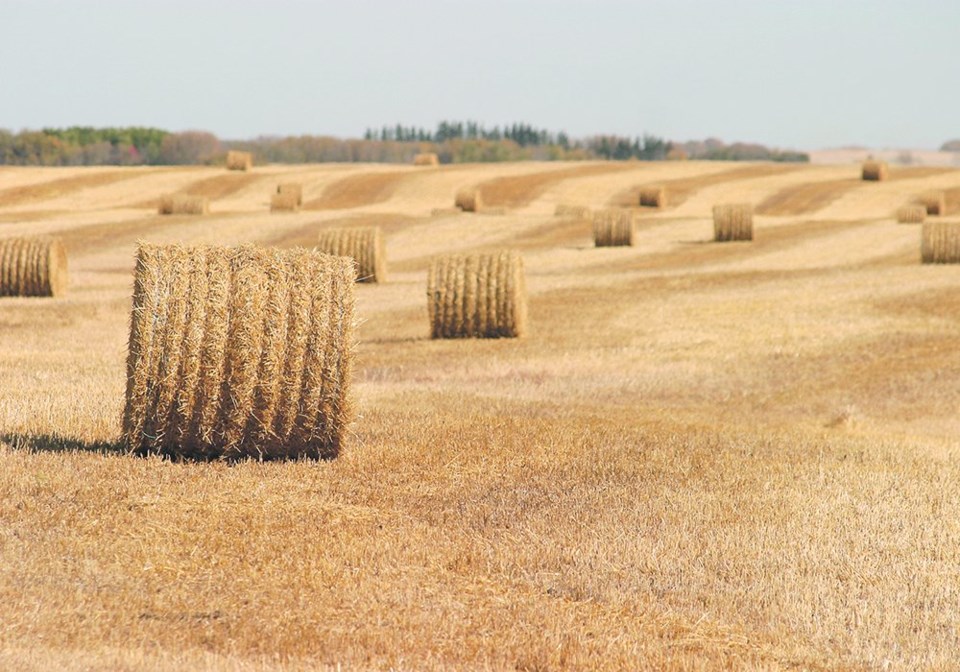WESTERN PRODUCER — Grain producers are again being encouraged to drop their straw at harvest so it can be baled and used by others for feed and bedding.
For the second straight year, the South Saskatchewan River Irrigation District No. 1 (SSRID) in Outlook, Sask., is co-ordinating a drop straw campaign for livestock producers who may face feed shortages this winter.
Rather than spreading it as chaff, irrigators are encouraged to sell their straw this fall.
“It’s community-minded farmers helping farmers,” said Matthew Lawless, a director at SSRID.
“Last year, with the drought, and then this year with the continuing drought in some parts of the province, irrigation land has more consistent and reliable sources of straw so irrigators are co-operating to provide a source of straw to stock growers who may require it for feed or for bedding to get their herds through the
The district has 125 irrigators with 46,000 acres under centre-pivot irrigation, much of it in the Rural Municipality of Rudy. Irrigation starts at Lake Diefenbaker, runs as far west as Outlook, as far east as Glenside and to the northern end of the RM.
The SSRID office is co-ordinating communication between farmers and livestock producers through the following process:
- A livestock producer looking to buy straw contacts Krystine Magel at the SSRID office.
- She will supply the producer with the name and phone number of an irrigator who may have straw available.
- The irrigator and producer will make a deal between themselves relative to the sale and removal of the straw.
- Magel will follow up with participating irrigators to determine how much straw they have available and will remove irrigators from the list once the irrigator is sold out of straw.
“We greatly appreciate the help of the irrigators to help livestock producers in a time of need,” said Chad MacPherson, general manager of the Saskatchewan Stock Growers Association.
“The value-added of irrigation is irreplaceable, so we really appreciate their help and them willing to do this again this year to help livestock producers in the province.”
Producers were quick to post interest in the initiative on the association’s social media site.
“In the first 24 hours, the posting has been viewed by nearly 8,000 people, just showing the level of interest in the initiative,” said MacPherson.
Organizers expect it won’t take long for all the SSRID straw to be spoken for. Straw from other irrigation districts, including Luck Lake and Riverhurst, has already been claimed.
“Generally, straw is something that is easier to come by, but lately people are valuing straw, honestly a little higher than it should be valued,” said Aaron Gray, chair of the Saskatchewan Irrigators Project Association.
Besides putting nutrients back into soil, it helps retain moisture during growth periods.
“It’s pretty tough sometimes for a producer to drop the straw on his or her farm and then not have the moisture holding capacity the following year,” he said.
However, some ranchers are trading manure for straw, while others are making deals with baling and trucking.
“There can be a bit of a trade-off there so that everybody wins. The only problem is, there’s logistics and transportation costs, so it only helps the farms that are closer to irrigation,” said Gray.
Added MacPherson: “With inflation, the cost of twine and fuel has really increased the cost of baling and hauling.”
According to the province’s moisture map, the southwestern and central regions are driest with hay and greenfield yields below normal.
“Thankfully, the drought isn’t as big as it was last year, but it still got a pretty good hold on a large portion of Saskatchewan,” said Gray.
Those interested in the drop straw process can contact Magel at 306-867-9923, Monday through Friday, 8 a.m. to 3:30 p.m.

